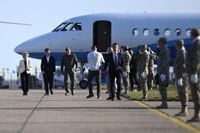On September 1, 2025, a chartered plane carrying European Commission President Ursula von der Leyen, her team, and journalists from Warsaw to Plovdiv, Bulgaria, became the center of a geopolitical storm, as conflicting reports swirled about possible Russian interference with its GPS navigation system. What began as a technical hiccup on approach to Plovdiv airport has since ballooned into a cross-continental dispute, with officials, experts, and media outlets offering sharply divergent accounts of what actually happened in the skies above Bulgaria.
The initial reports emerged quickly. According to The Financial Times, citing unnamed officials, the plane’s GPS navigation system was “disabled” in a “suspected Russian interference attack,” forcing the pilots to circle Plovdiv airport for an hour and land using paper maps. The story, which included the testimony of Financial Times Brussels bureau chief Henry Foy, who was on board, prompted immediate and vehement denunciations of the Kremlin by top Western officials. The European Commission, sticking to its account, said it had received information from Bulgarian authorities suggesting “blatant interference by Russia.” NATO chief Mark Rutte echoed these concerns, heightening the sense of alarm in Brussels.
Yet, as the week unfolded, Bulgaria’s own leaders began to cast doubt on the more sensational aspects of the story. Addressing parliament on September 4, Prime Minister Rosen Zhelyazkov stated, “Throughout the entire duration of the flight, the transponder emitted a constant, good-quality GPS signal. There is no indication of the presence of prolonged interference and jamming.” He added, “During the approach of the aircraft … the GPS signal disappeared, which was reported by the pilots of the aircraft to Bulgarian air traffic control. During the conversation, a landing using the so-called ILS approach, i.e. by instruments, was proposed.”
Deputy Prime Minister and Transport Minister Grozdan Karadjov reinforced this position, confirming that no GPS jamming data existed and that no report blaming Russia had been shared with the EU. He told Euronews that Bulgarian aviation authorities did provide the European Aviation Safety Agency (EASA) with a report of the pilot’s conversation with the control tower, which referred only to “minor issues” with the GPS, not Russian interference. Karadjov noted, “EASA still needs to remove the computers on board the aircraft and see what these computers registered.”
Despite these clarifications, the European Commission held its ground. Deputy chief spokesperson Arianna Podestà told reporters, “There was GPS interference,” and added that “radio interference was confirmed by the Bulgarian Air Traffic Services Authority” earlier in the week. Podestà also pointed out, “What matters ultimately is the plane landed successfully, and, of course, this is the point that is of greatest interest for us.”
Technical experts and independent analysts have since weighed in, further muddying the waters. Flightradar24, a widely respected flight-tracking service, reported that the flight took one hour and 57 minutes—only nine minutes longer than scheduled. Their analysis showed the aircraft’s transponder “reported good GPS signal quality from take-off to landing,” with no evidence of so-called “spoofing” attacks, which are sophisticated attempts to deceive navigation systems. Flightradar24 confirmed that pilots switched from GPS to the Instrument Landing System (ILS) for their final approach, but cautioned that “there are numerous issues that could have affected the crew’s ability to perform a GPS-based approach that aren’t related to jamming or spoofing.”
Ian Petchenik, Flightradar24’s director of communications, explained to Euronews that interference “could have been internal to the aircraft, or from another source.” He clarified, “The NIC value for this flight was 8 throughout. There’s also a secondary value called NACP, and that value was also within very high ranges, leading us to not see any jamming of the ADS-B signal.” However, telecommunications expert Mahmoud Elsahoury from the University of Vaasa told Euronews that if the signal level was good yet the pilot was circling, “this is a very big indicator that it was a spoofing incident.”
As the debate intensified, Zhelyazkov appeared to shift his stance, acknowledging that “in this case, we obviously have interference,” attributing it to “satellite interference systems based in Crimea.” He also suggested that the “informational mess” surrounding the incident was being exploited by opposition parties to “undermine Bulgarian institutions.” Nevertheless, he ordered the Civil Aviation Administration to contact the company operating the flight for a further check of the aircraft’s instruments and computers, underlining the government’s commitment to a thorough investigation.
Moscow, for its part, ridiculed the accusations as “preposterous” and “100% made-up fake,” with Russian Foreign Ministry spokesperson Maria Zakharova dismissing the GPS jamming reports as a distraction from Europe’s economic crisis. The Kremlin’s denial was echoed by Bulgarian officials, who repeatedly stated that no direct evidence of Russian involvement had been found.
Meanwhile, the broader context of electronic warfare in Europe loomed large. Zhelyazkov noted that Russia’s radio-electronic warfare operations based in Crimea have caused disturbances in the radio frequency spectrum in many parts of Europe. Since Russia’s full-scale invasion of Ukraine in February 2022, countries bordering Russia—including Finland, Latvia, Lithuania, and Estonia—have reported increased electronic interference affecting flights, ships, and drones. The European Commission acknowledged that GPS jamming incidents are now “very regular” near the EU’s eastern border and called for coordinated EU action to address the growing threat.
Despite the swirl of claims and counterclaims, the facts remain: the plane carrying Ursula von der Leyen landed safely in Plovdiv after pilots switched to a backup landing system. There is no evidence the aircraft circled for an hour or relied on paper maps for landing, as some initial reports suggested. The technical data reviewed by flight experts and Bulgarian authorities points to a brief loss of GPS signal during approach, not a prolonged or sophisticated attack. Whether the disruption was caused by Russian electronic warfare, technical malfunction, or some other factor remains under investigation.
For now, the incident underscores the complexity of attributing responsibility in an age of hybrid threats and information warfare. With both sides trading accusations and technical experts divided, the search for definitive answers continues. But one thing is clear: the skies over Europe are becoming an increasingly contested space, and the political fallout from even brief disruptions can be as turbulent as the flight path itself.






